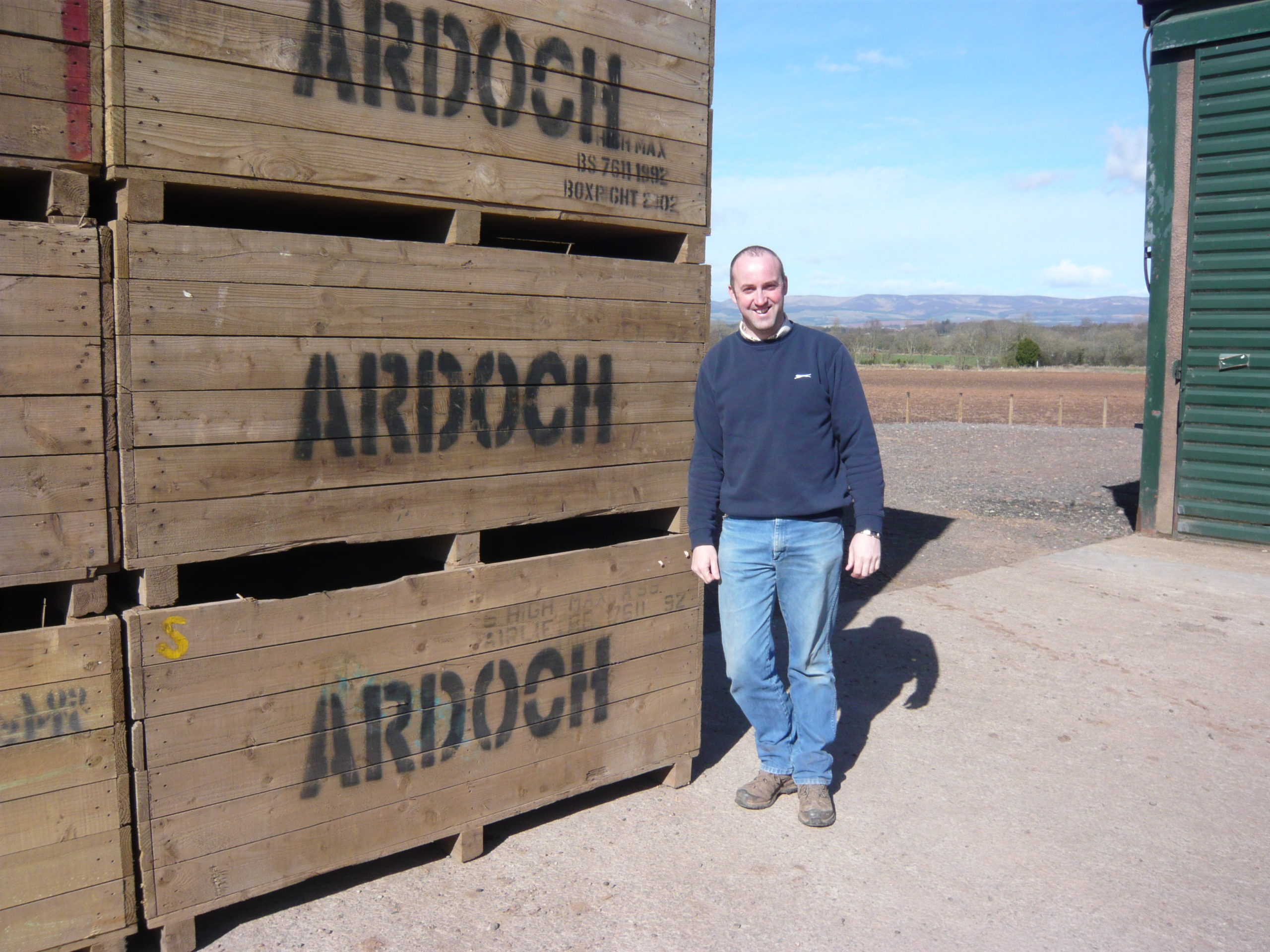Five years on from hosting Farming For A Better Climate (FFBC)’s pilot project, Montrose farmer Willie Officer has seen the results of a changed approach to some on-farm practices to see yields improve and input costs reduce.
Farming 900 acres of all arable, including potatoes and daffodils bulbs, over a mix of owned, rented and contracted land, Willie got involved with the project, run by SAC Consulting, to experiment with different regenerative methods, from floatation tyres to solar energy, to see how they would improve the soil, crop quality and profit margins.
“We’ve always been proactive at Ardoch of Gallery with trials and seeing how we can progress the farm,” explains Willie. “We are a traditional Angus family farm, so we need to be constantly looking at ways to make the business more profitable. I was curious about this more regenerative approach, both for improving the business now but as much, especially as my children grow up and my son is showing aspirations to take over, for the next generation. We took livestock out of the rotation when we had to sell the cattle during the BSE years, and I wanted to see if there were other ways we could be doing a better job to boost the soil and wider environment.”
Running cold stores for bulbs in the summer and potatoes during the winter, the farm has high energy usage. Through the FFBC programme, the Officers looked at various renewable options and decided solar panels were the best fit for their system. Since 2017, Willie says these have outperformed the predictive figures, helped by some good summers in recent years, which has been very welcome with the recent increase in energy costs. There’s still reliance on the main grid over the winter, but demand is largely covered by the panels in the summer. Wind turbines were also considered, but they were advised by SSE that it did not have the capacity to add the farm’s energy to the grid.
Soil was a key focus during the three-year project (2015-18) and, continuing this, where Willie has seen significant improvements. Aidan Monaghan of SOYL came to speak to the group of farmers formed around the FFBC project. Using more detailed soil sampling, satellite imagery and a fertiliser spreader with variable rate capability we are now able to feed the crop the appropriate nutrition. Willie says that while he may not have reduced inputs, he’s being smarter with how he uses them, resulting in a much more even crop evidenced by the GPS mapping on the combine.
Having seen the compaction of the soil by digging soil pits at the start of the project, Willie introduced floatation tyres and the combine is on tracks, which has resulted in better root structure as well as yields:
“The sure sign is you can’t see any wheel tracks from the previous rotation. Not everything we tried worked, though. Cover crops weren’t great, but the understanding around these has moved on so much since we looked at it – the different mixes for particular soils, the circumstances they’re grown in and the Scottish climate. We’d definitely look at it again as it would work well with early harvest of bulbs.
“David Ross at SAC Consulting is absolutely key to making things happen in this area through his drive and enthusiasm. If I hadn’t been part of FFBC we wouldn’t be as far down the road, but I definitely feel we’re more ahead of the game and are quicker to try new things. I am really appreciating seeing what the current FFBC farmers are doing with the soil regenerative agriculture group approach; learning from each other is so important. We all need to work together to make it happen. My agronomist Gordon Tannock at Agrii has also played an important part. Involved at every FFBC meeting and the link between us and SOYL, he’s been so much more than an agronomist and is integral to the farm’s overall management.”
Willie now has a straw-for-dung arrangement with a neighbour, which he wanted to introduce in the absence of livestock. This has increased the number of bugs, worms and insect life in the soil. On his owned land, he has planted wildflower headlands with seed subsidised through supplying Asda/IPL with potatoes, and says the wildlife is “phenomenal”. He min-tills some land, but strip tilling is not currently viable.
The family has started a haulage company to bring in diversified income, and going forward, battery storage is on the radar along with a second solar array, but Willie is waiting for the technology to advance.
David Ross of SAC Consulting said this process has made the farmers keeping in touch with the work of FFBC more aware of what can be done to make steady changes to sustain their farms into the future:
“Many of the measures we explored with Willie did not bring an instantaneous return, but it’s great to see, five years after the end of the project, the ways in which he continues to review processes to make marginal gains that are consistently pushing yields and the business on.”
For more information on Farming for a Better Climate, visit www.farmingforabetterclimate .org or follow the project on Facebook and Twitter @SACFarm4Climate
